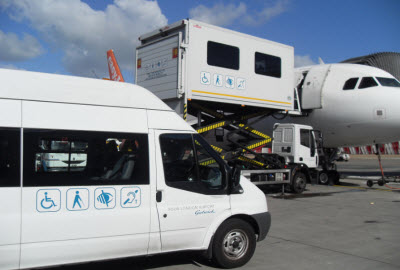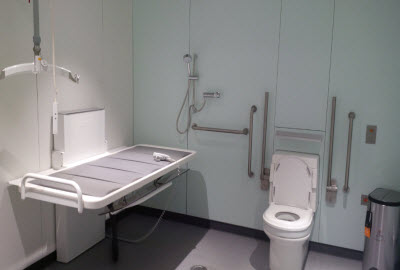Efficiency or empathy what is best for disabled flyers
- Written by Roberto Castiglioni
 Disabled flyers' numbers are soaring, growing at double digit rates at airports across the world.
Disabled flyers' numbers are soaring, growing at double digit rates at airports across the world.
This is positive news. It means the hard work of disability advocates, lawmakers, charities, airlines, and airports is paying off.
It also means there is widespread awareness that flying with a disability isn’t a daunting experience.
Services and support are there to meet the needs of people with physical, sensory, and cognitive impairments.
This does not mean the work is done. We still lack common standards. Some airports and airlines are still work in progress. But overall, we are in a much better place than we were just ten years ago.
It would be dangerous to sit back and relax. We must consolidate achievements and build upon them. This is going to be easier than in the past as we have plenty of data we can analyse, assess and translate into innovation.
First and foremost, we must understand what disabled flyers value most. Do they prefer efficiency or empathy? Can the human touch mitigate service shortfalls or progress in access to air travel made us a bit more demanding?
Some readers who have been following me over the years may think I am starting to sound like a broken tape recorder, always  playing the same tune.
playing the same tune.
Understanding and meeting the needs of disabled flyers is beneficial to a much wider segment. Over 65s, families with infants and toddlers, first-time flyers.
And the list gets longer. Think of this: even travelers who don’t speak English benefit from one of the core by-products of access to air travel. How? Intuitive wayfinding replaces the need to understand English, a language unknown to over 50 per cent of people on this planet.
My approach to access to air travel is based on common sense. To build a solid, lasting house you must start from its foundation.
I understand the urge of some advocates to focus on training. That’s where business is, where money is made.
This approach is like building a house starting from the first floor. Inevitably, the house will keep crumbling. More business for trainers but worse travel experience for disabled people.
This is a reason good enough to change our approach and start from the foundation. For example, we need to design airports and airplanes with Universal Design at the centre of the project.
 Universal Design recognises the endless variety of individual abilities. Everyone passes through childhood, temporary illness, injury and old age. By putting human diversity into context, Universal Design creates an environment easier for all people to use.
Universal Design recognises the endless variety of individual abilities. Everyone passes through childhood, temporary illness, injury and old age. By putting human diversity into context, Universal Design creates an environment easier for all people to use.
Taking Universal Design into the airport context means a well-designed, efficient airport layout that minimises travel distances for passengers and is most accessible and convenient for everyone to use.
It sounds so simple, doesn’t it? Next time you are traveling through an airport isolate yourself from the noise and crowd and take a closer look around. You will be amazed how many little improvements will come to your mind.
I started this article talking about a choice between efficiency and empathy. I for one don’t want to choose. I want both.
A good foundation will give you efficiency; the human touch empathy. Combine both and you have a nearly perfect travel experience.
Embracing the opportunity disabled passengers represent and meeting their needs inevitably translates into making everyone’s journey better. It is as simple as that.










